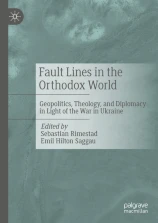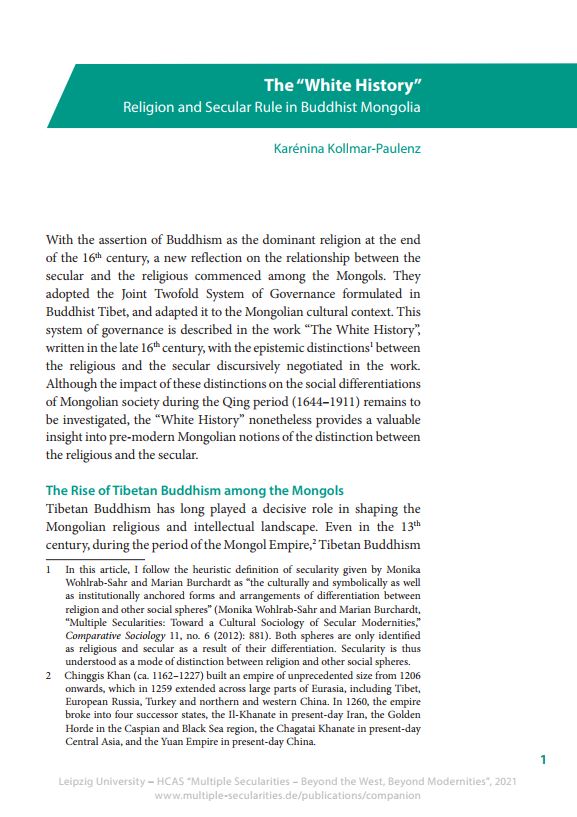
Publications
The work of the research group finds its expression in various publication formats. In addition to monographs, edited volumes and articles by individual members of the research group, we also make (preliminary) research results available for academic discourse in the form of working papers.
Furthermore, with the Companion to the Study of Secularity, the research group is pursuing a long-term, collaborative publication project that aims to make research on phenomena of the conceptual distinction and structural differentiation of "religion" accessible to a larger academic audience and thus to contribute to opening up a new field of research and facilitating interdisciplinary exchange.
Working papers as well as entries for the Companion to the Study of Secularity are reviewed by at least two peers from the research group prior to publication.


 Since the tenth century, the main religious force in Russia has been Orthodox Christianity. This branch of the Christian Church developed differently from its Western counterpart, Latin Christianity, after the geopolitical paths of the Western and Eastern Roman Empires diverged following the Migration Period in Late Antiquity. The different developments in the Christian East and West also led to distinct path dependencies, which informed the conceptualisation of the boundaries between the religious and the secular spheres. This working paper probes these differences, via an analysis of two important texts from early modern Russia: Feofan Prokopovich’s 1718 Palm Sunday sermon about “The Dignity and Power of the Sovereign,” and his 1721 “Spiritual Regulation.” By focusing on these two documents, whose conceptual foundations arguably shaped the structure of the Russian church for two centuries, the paper provides a first glimpse into the official discourse of religion and its discontents in early eighteenth-century Russia.
Since the tenth century, the main religious force in Russia has been Orthodox Christianity. This branch of the Christian Church developed differently from its Western counterpart, Latin Christianity, after the geopolitical paths of the Western and Eastern Roman Empires diverged following the Migration Period in Late Antiquity. The different developments in the Christian East and West also led to distinct path dependencies, which informed the conceptualisation of the boundaries between the religious and the secular spheres. This working paper probes these differences, via an analysis of two important texts from early modern Russia: Feofan Prokopovich’s 1718 Palm Sunday sermon about “The Dignity and Power of the Sovereign,” and his 1721 “Spiritual Regulation.” By focusing on these two documents, whose conceptual foundations arguably shaped the structure of the Russian church for two centuries, the paper provides a first glimpse into the official discourse of religion and its discontents in early eighteenth-century Russia.

 With the assertion of Buddhism as the dominant religion at the end of the 16th century, a new reflection on the relationship between the secular and the religious commenced among the Mongols. They adopted the Joint Twofold System of Governance formulated in Buddhist Tibet, and adapted it to the Mongolian cultural context. This system of governance is described in the work “The White History”, written in the late 16th century, with the epistemic distinctions between the religious and the secular discursively negotiated in the work. Although the impact of these distinctions on the social differentiations of Mongolian society during the Qing period (1644–1911) remains to be investigated, the “White History” nonetheless provides a valuable insight into pre-modern Mongolian notions of the distinction between the religious and the secular.
With the assertion of Buddhism as the dominant religion at the end of the 16th century, a new reflection on the relationship between the secular and the religious commenced among the Mongols. They adopted the Joint Twofold System of Governance formulated in Buddhist Tibet, and adapted it to the Mongolian cultural context. This system of governance is described in the work “The White History”, written in the late 16th century, with the epistemic distinctions between the religious and the secular discursively negotiated in the work. Although the impact of these distinctions on the social differentiations of Mongolian society during the Qing period (1644–1911) remains to be investigated, the “White History” nonetheless provides a valuable insight into pre-modern Mongolian notions of the distinction between the religious and the secular.